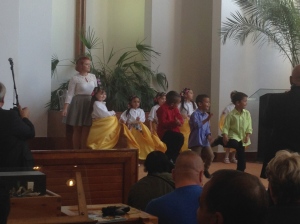“All these names are given to us by others,” said Miki, a Roma pastor from Serbia. In his presentation on Roma identity at the 2nd European Roma conference, he was listing different names people call the Roma. “But who has the right to name us, to tell us who we are?”

Picture by the Good Story Team.(thegoodstory.co)
Claiming identity in Christ, which liberates from shame and self-rejection, also revitalizes Roma identity. This was just one of the major themes emerging from the conference.
“I did not feel worthy to sit with the non-Roma,” one pastor said.
“Even though I ‘look’ Roma because of my skin, I was educated and so I did not fit the expectation others have of who the Roma are. So when they would ask me if I was Roma, I would say no, because I did not want to be rejected,” another pastor said.
Overcoming rejection and embracing identity in Christ is key to transformation. But this concept is not just about ethnicity—later on, I applied Miki’s question to gender issues at the women’s panel.
“Who has the right to tell you who you are as a woman?” I asked, referencing Jesus’ call of ‘Daughter’ to the bleeding woman in the gospels . We had been having a lively discussion on

Picture by the Good Story Team.(thegoodstory.co)
women’s issues, the place of Roma women in ministry, and sharing personal stories and reflections. To my surprise, the room had filled up with both men and women—though this might have been because (maybe providentially) there was no Romanian translator at another workshop. Roma men talked about the place they gave their wives in ministry. Roma women talked about their views of their role in ministry. Non-Roma asked probing questions and listened. As the time grew to a close, it was difficult to shut down the conversation, as each insisted on having a voice and opinion in the discussion.
This robust discussion was one of my highlights at the conference—connecting ministry, personal story, theology, and culture in a space where everyone wanted to share and contribute.
But Roma claiming identity in Christ is only part of the transformative process. Non-Roma must also understand that every human is God’s sacred image bearer. “We have no right to say who is worthy or worthless because no one chooses where and when to be born,” Miki points out. Without a mutual recognition of the ‘other’ as our brother and sister—across ethnic and gender barriers—the church cannot have a widespread prophetic voice to a society growing ever more divided by fear and suspicion.

Picture by the Good Story Team.(thegoodstory.co)
“Who told you who you are? Who told you how much you are worth?” Miki asked the audience.
Nelu, another Roma pastor from Romania, pointed out that in the Romanian, Jesus’ exhortation to the hemorrhaging woman translates into the word ‘dare.’
Accepting our true identity also necessitates action, a courageous movement into life. Dare to step forward, to walk in peace, to be freed from suffering.
“Don’t be led by your problems,” Nelu challenged his workshop participants, “dare to be led by Jesus.”


